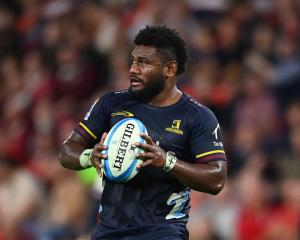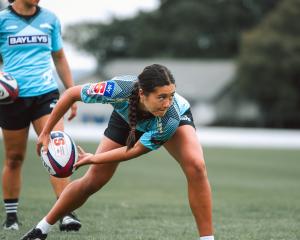ODT Online rugby writer Jeff Cheshire picks out his key points from the All Blacks' loss to the Wallabies in Sydney on Saturday night.
One dimensional
As much as the All Blacks go on about being creative and adaptable, they really are not showing it. They have become so predictable that every rugby fan on the planet must know their tactics by now and when those tactics are not working, they do not look to change. Australia did to them exactly what Samoa did: got up fast and smothered the attack. It was plain to see and the All Blacks were letting them do it. There was space directly in behind the line, but they never looked to use it.
A few wee kicks, be it a grubber or a chip, would have at least forced the Australian defensive line to turn around and scramble, while also putting doubt into their minds. They could no longer afford to simply rush up and make the tackle, as they would be leaving an area behind them exposed, particularly with the back three standing so deep. Yet the All Blacks just kept shovelling it on to their ball runners in the midfield, where the Wallabies were queueing up to smash them. Too predictable and far too easy to read.
Are they saving something?
The flip side of the one-dimensional argument is that perhaps the All Blacks are indeed keeping something up their sleeve for the World Cup. Of course you would not expect them play all their cards this early in the piece. But if they do have a Plan B, it is going to be drastically different to anything we have seen in recent times and they are going to be using it without having had a lot of ingame practice.
Forward runner short ball still not working
One of the All Blacks' favourite tactics of the past four years has been for a forward runner to take the ball to the line and throw a short ball to second runner. In theory it sounds alright, draw the man and then put a runner into a gap. But that is not how it has worked and that became obvious pretty quickly in 2012. It is a pass and catch under pressure and the players are simply not good enough to execute it. Too often it accounts for dropped balls, as players are having to catch a pass with a defender already all over them. Essentially it becomes a hospital pass. The Australians were on to it and it was a large reason there were so many handling errors from the All Blacks.
When the ball is caught, it generally isolates the player, as defences have taken to tackling both the passer and the receiver, taking out the closest support player. Then you have players like David Pocock and Michael Hooper lurking around, exploiting the lack of support readily available support players and turning over the ball. Pretty simple really. Particularly when you have a team rushing up like the Australians were, you are walking straight into trouble. They need to try something different, whether it be the kick in behind, or just holding the ball, getting to the ruck and trying to build some phases.
Dan Carter needs to take control
If you are going to pick Dan Carter at first five for his experience and ability to control a game, then you really need him to start actually dictating the way a game is played. Unless he is playing completely to an instruction, which you would assume he is to an extent, he really needs to do a better job of directing the team. He is the experienced head in the key position in terms of dictating the way the team plays. So he needs to be the one to take the game by the scruff of the neck and make the decision to change when things are not working. Rather than just shovelling the ball on to the men outside him to get smashed, he needs to be the one that kicks in a way which will manipulate the defence.
The All Blacks really need to trust players like Carter to take the right options, to know that they will kick when it is the time to do that and to hold it when it needs to be held. Likewise, Carter needs to trust himself to do the same. Throwing the ball around recklessly is not intelligent rugby and you have to question why you would ever pick players, or implement a gameplan, in which intelligent rugby was not the first requirement.
The rest of his game was not amazing either with missed tackles, poor kickoffs and a couple of missed goal kicks all evident.
Still question marks over some players
With the World Cup just six weeks away there are still players with plenty of questions to answer and they are running out of time to do so. Prop is clearly a concern. Tony Woodcock played as well as he has for years around the park, but still provided little impact in contact, while Owen Franks is not providing the same spark he did a few years ago. Ben Franks too has yet to convince, still a liability discipline-wise and is hardly a player you notice make an impact when he comes on.
On top of that, the scrum was poor. That has got to be concerning and it is probably a bit late to bring new players in. Behind them Luke Romano is not offering enough and you get the impression he is being persisted with to see if he can play himself into form. It doesn't seem to be happening though, so why not give Jeremy Thrush or James Broadhurst a run?
In the backs Sonny Bill Williams once again faltered against a decent team. He drifted in and out of the game on attack, took a series of poor options, notably with two awful kicks and while being tidy on defence, he did not defend with the intelligence to apply pressure like Malakai Fekitoa did.
He does not have the instinct to know when to do things because he simply has not played enough rugby. Yet it would not be a surprise if he goes to the World Cup, looks a million bucks against the likes of Argentina and Tonga, and then goes missing in a game where decision-making under pressure becomes of importance. Of course he was not the only poor performer, but he remains unproven against top opposition, whereas the others have all shown their worth.
Players who have impressed
Nehe Milner-Skudder was the big success story on debut, looking threatening every time he touched the ball and making several good breaks. He has to play next week and if he plays well, it would be hard to leave him out of the World Cup squad. If we say Ben Smith is the fullback, with Julian Savea and Charles Piutau the obvious starting wing combination, that means Milner-Skudder would be competing with Israel Dagg. Based on form, it would be hard to justify taking Dagg over the electric Milner-Skudder, particularly when Piutau and Beauden Barrett can cover fullback.
At hooker Codie Taylor has brought energy and has been athletic in the loose, while Nepo Laulala got around the park well despite making a few mistakes. You would have to think both of those two have done enough to warrant World Cup selection.
Australia are capable of getting up
It is nothing new to see Australia turning up and playing a blinder like they did. They are a team that can beat anyone in the world on their day, particularly at home. Consistency is an issue, but when they decide to bring their physical game and not be intimidated, then they are a pretty tough opponent. They seem to like doing it against the All Blacks too and in a lot of ways you can see that they do not fear the All Blacks like other teams do, while they play them often enough to know how to beat them too. But then they can struggle against teams that play a different style, particularly northern hemisphere sides.
It is not to say that they are not a good team, but it is useful to remember that form is not always the be all and end all when it comes to the Australian rugby team.










